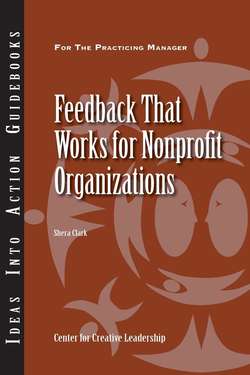Читать книгу Feedback That Works for Nonprofit Organizations - Shera Clark - Страница 8
На сайте Литреса книга снята с продажи.
ОглавлениеEffective Feedback and Nonprofit Organizations
Effective feedback is an important and efficient way to let people know the impact of their behavior so they are able to make informed choices regarding future actions. Feedback is also a way to help people who work together do so more efficiently, because it creates open communication, which allows for frank discussions regarding problems and concerns.
Effective feedback consists of crafting a simple and direct message about behavior that separates what happened from how we think or feel about it, reduces uncertainty and ambiguity, and provides actionable information rather than messages that have to be interpreted. Such feedback can also help individuals make better choices about their behavior and help people work together more efficiently, because it fosters open and direct communication. It also provides people with tangible information about how their actions have had an impact on others. People are likely to change ineffective behaviors if they realize they are having a negative impact or understand exactly what it is they are doing that is getting in the way. Effective feedback empowers people with the information they need in order to know whether they are having the impact they want.
Nonprofit organizations increasingly see staff development as a critical goal in their work. In most if not all nonprofit organizations, staff members are the reason the mission is achieved (or not). Even if your development budget is nonexistent, effective feedback can be a low-cost and simple way to develop yourself and the people you work with. Effective feedback can also be part of a larger development effort in service of your organization’s mission.
Effective feedback empowers people with the information they need in order to know whether they are having the impact they want.
The work of nonprofit organizations is challenging, particularly as the contexts within which they work are increasingly complex and the people with whom they work may have different backgrounds and perspectives. In such a diverse environment, utilizing effective feedback is essential in facilitating successful communication across backgrounds and boundaries. This guidebook will show you how to use such feedback in your organization, and how to establish feedback systems that will continue to contribute to your nonprofit’s overall mission and effectiveness as an organization.
What Is Effective Feedback?
The key to effective feedback is the ability to create and deliver a specific message based on observed behavior. This kind of message enables the receiver to walk away understanding exactly what he or she did and what impact it had on you. When feedback is specific and direct, there is a good chance that the person getting the feedback will be motivated to begin, continue, or stop behaviors that impact effectiveness. Think about statements you have made to others concerning their behavior, and ask yourself: What did they do that made you think they were good leaders? What did they say and how did they say it to make you think they communicate well? What did they do that made you conclude their thinking wasn’t strategic enough?
In the pages that follow you will learn how to answer such questions as you develop your feedback skills. After you have read this guidebook, you will be able to
• give feedback that accurately represents your thoughts without blame or judgment
• become more conscious of a person’s behavior and the messages it sends
• increase your awareness of the emotional responses you have to the actions of others
• be able to ask for more effective feedback that you can use for your own development
